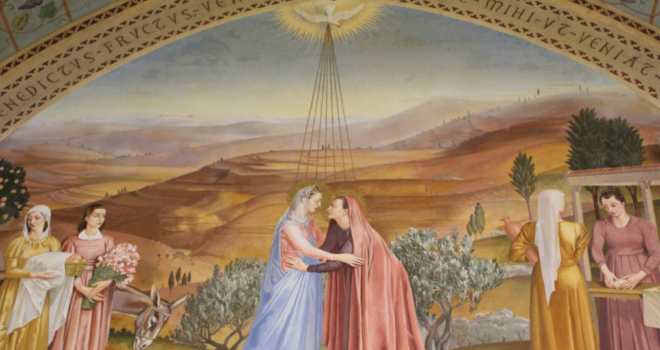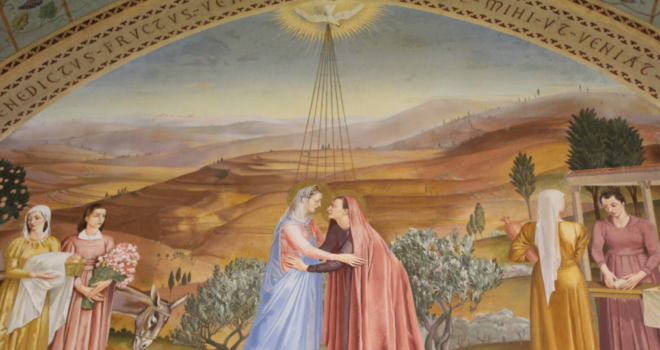There are a lot of differences between Catholicism and Protestantism. For example, we disagree about the pope, the saints, the sacraments, indulgences, and Purgatory. But arguably the biggest difference between us has to do with our beliefs about Mary. For most Protestants, she was just a woman who lived 2,000 years ago. Sure, she was Jesus’ mother, but that doesn’t have much of an impact on their spiritual lives today. In contrast, Mary is a huge part of Catholic spirituality. We venerate her and pray to her, and we even consider her our spiritual mother.
So if you ever discuss faith and theology with your Protestant friends or relatives, this topic is bound to come up sooner or later. You’ll need to know how to explain and defend our Marian beliefs and practices, and in this article, I want to help you do just that. In particular, I want to discuss the biblical basis for venerating Mary. Why do we honor her even though she lived two millennia ago? Well, there are a lot of reasons, and one of them comes right out of the New Testament.
“Blessed Are You Among Women”
In the first chapter of Luke’s Gospel, after the angel Gabriel tells Mary that she is going to be the mother of the Messiah, she goes to visit her cousin Elizabeth. This is a pretty famous story, and even though it is relatively short, it contains a wealth of teaching for us. For example, here is what Elizabeth says when she first sees her cousin:
“And when Elizabeth heard the greeting of Mary, the babe leaped in her womb; and Elizabeth was filled with the Holy Spirit and she exclaimed with a loud cry, ‘Blessed are you among women, and blessed is the fruit of your womb! And why is this granted me, that the mother of my Lord should come to me? For behold, when the voice of your greeting came to my ears, the babe in my womb leaped for joy. And blessed is she who believed that there would be a fulfillment of what was spoken to her from the Lord.’” (Luke 1:41-45)
That is some pretty high praise. When was the last time you called someone the most blessed woman on earth? You might be tempted to say never, but if you’re Catholic, that is not actually true. Every time we pray the Hail Mary, we repeat Elizabeth’s line, “Blessed are you among women, and blessed is the fruit of your womb.” We praise Mary as the most blessed woman in history, and we do this because that is what Scripture itself says. The New Testament calls Mary that, and we just follow its lead.
“All Generations Will Call Me Blessed”
But this raises a question for us: Should we really follow Elizabeth’s example? Should we praise Mary just like her cousin did? At first, it might seem easy to say no. Sure, Elizabeth did it because Mary was standing right in front of her, but that doesn’t apply 2,000 years later. Mary is no longer with us (at least not physically), so why should we honor her the way Elizabeth did two millennia ago?
The answer is actually pretty simple. Take a look at Mary’s response to Elizabeth’s very flattering words:
“And Mary said, ‘My soul magnifies the Lord,and my spirit rejoices in God my Savior, for he has regarded the low estate of his handmaiden. For behold, henceforth all generations will call me blessed.’” (Luke 1:46-48)
It is no coincidence that Mary says all generations will call her blessed immediately after her cousin calls her blessed two times in the span of a few verses, so unless you are dead set against it, the implication is clear: we should in fact follow Elizabeth’s lead in honoring Mary. See, this passage doesn’t mean that subsequent generations will merely consider Mary blessed. It doesn’t mean that we should intellectually acknowledge the fact that she was blessed and then forget about her.
“Hail Mary”
No, in context, it is clear that the third Gospel is teaching us to venerate Mary just as her cousin did. Mary’s response to Elizabeth’s words of praise means that we should echo those words throughout history, and that is exactly what we do when we pray the Hail Mary.
And from that, we can extrapolate and say that all the honor and praise we heap on her, both in the Hail Mary and in any other prayers we choose to pray, is the fulfillment of her prophetic words that all generations would call her blessed. It all stems from this one Bible story, so the next time someone challenges your devotion to Mary, you know what to say. Venerating her isn’t a pagan corruption of the true Christian faith or a medieval addition to it. No, it is right there in the New Testament, so if we want to follow Scripture’s teachings, then Mary should play a key role in our spiritual lives.













